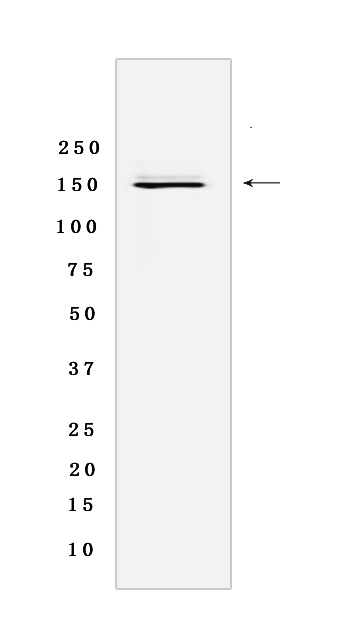Timeless Rabbit mAb [149T]Cat NO.: A85171
Western blot analysis of extracts from NIH/3T3 cells lyastes.using Timeless Rabbit mAb [149T] at dilution of 1:1000 incubated at 4℃ over night
Product information
Protein names :TIMELESS,TIM,TIM1,TIMELESS1,TIM_HUMAN,Protein timeless homolog
UniProtID :Q9UNS1
MASS(da) :138,658
MW(kDa) :150 kd
Form :Liquid
Purification :Protein A purification
Host :Rabbit
Isotype :IgG
sensitivity :Endogenous
Reactivity :Human,Mouse,Rat
- ApplicationDilution
- 免疫印迹(WB)1:1000-2000
- The optimal dilutions should be determined by the end user
Specificity :Antibody is produced by immunizing animals with a synthetic peptide of Human Timeless.
Storage :Antibody store in 10 mM PBS, 0.5mg/ml BSA, 50% glycerol. Shipped at 4°C. Store at-20°C or -80°C. Products are valid for one natural year of receipt.Avoid repeated freeze / thaw cycles.
WB Positive detected :NIH/3T3 cells lyastes
Function : Plays an important role in the control of DNA replication, maintenance of replication fork stability, maintenance of genome stability throughout normal DNA replication, DNA repair and in the regulation of the circadian clock (PubMed:9856465, PubMed:17141802, PubMed:17296725, PubMed:23418588, PubMed:26344098). Required to stabilize replication forks during DNA replication by forming a complex with TIPIN: this complex regulates DNA replication processes under both normal and stress conditions, stabilizes replication forks and influences both CHEK1 phosphorylation and the intra-S phase checkpoint in response to genotoxic stress (PubMed:17141802, PubMed:17296725). TIMELESS promotes TIPIN nuclear localization (PubMed:17141802, PubMed:17296725). Involved in cell survival after DNA damage or replication stress by promoting DNA repair (PubMed:17141802, PubMed:17296725, PubMed:26344098, PubMed:30356214). In response to double-strand breaks (DSBs), accumulates at DNA damage sites and promotes homologous recombination repair via its interaction with PARP1 (PubMed:26344098, PubMed:30356214). May be specifically required for the ATR-CHEK1 pathway in the replication checkpoint induced by hydroxyurea or ultraviolet light (PubMed:15798197). Involved in the determination of period length and in the DNA damage-dependent phase advancing of the circadian clock (PubMed:23418588). Negatively regulates CLOCK|NPAS2-ARTNL/BMAL1|ARTNL2/BMAL2-induced transactivation of PER1 possibly via translocation of PER1 into the nucleus (PubMed:9856465). May also play an important role in epithelial cell morphogenesis and formation of branching tubules (By similarity)..
Tissue specificity :Expressed in all tissues examined including brain, heart, lung, liver, skeletal muscle, kidney, placenta, pancreas, spleen, thymus and testis. Highest levels of expression in placenta, pancreas, thymus and testis..
Subcellular locationi :Nucleus. Chromosome.
IMPORTANT: For western blots, incubate membrane with diluted primary antibody in 1% w/v BSA, 1X TBST at 4°C overnight.


